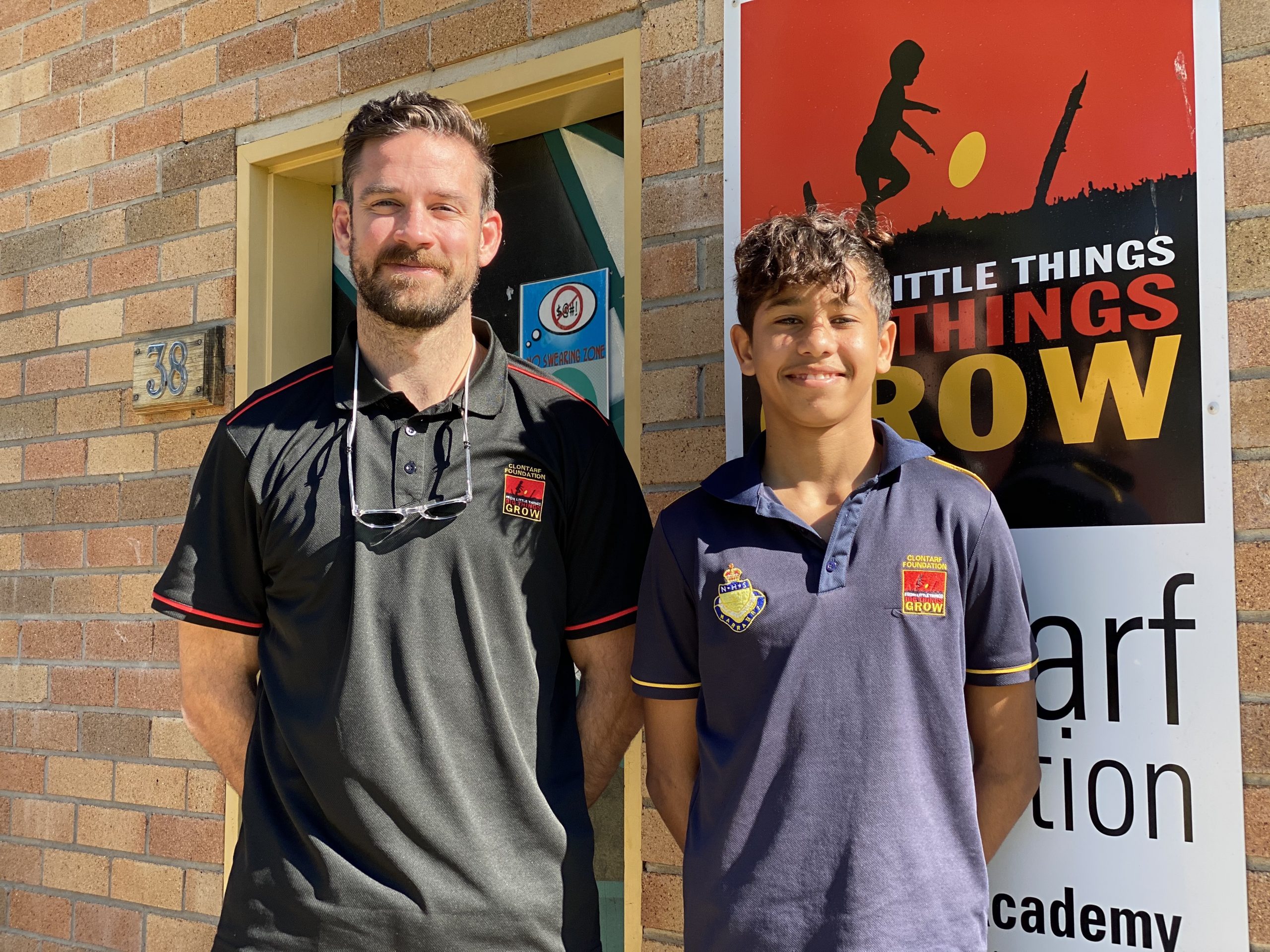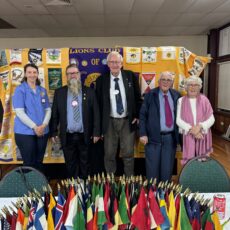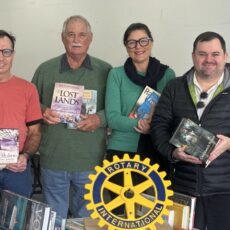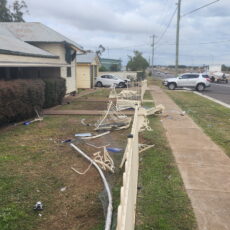Alex Schwarz is a man of many talents. He’s played professional rugby in America, he has a law degree, a sports management degree, but above all, he has a passionate drive to make a difference.
And that’s why the Narrabri High School community was thrilled to welcome Alex as the new director of its Clontarf Academy in May.
The Clontarf Foundation aims to improve the education engagement, school attendance rates, life skills and employment prospects of young Aboriginal and Torres Strait Islander men.
“If you can have a positive influence on someone’s life at an early age, it can make such a huge difference because you can help to set them on the right track,” said Alex in an interview with The Courier.
Alex’s new Clontarf role is a world away from the high-flying job he had this time last year, when he was working for a successful sports marketing agency based in a plush New York City office.
“We had a great view. We were literally on the waterfront overlooking Lower Manhattan,” said Alex.
“The office was between the Brooklyn Bridge and Manhattan Bridge.”
However, for Alex, something about leading a fast-paced corporate lifestyle didn’t feel quite right.
“I just didn’t find much meaning in what I was doing.
“I was working in the brand business for this agency and essentially we were just helping to make a rich company even richer.
“Sometimes I’d just question why I was doing 16-hour days on work I didn’t really care about.”
After six years away, Alex was missing home, looking for purpose and becoming tired of living in the place famous for being ‘The City That Never Sleeps’.
“I was getting over it and thinking that if I wanted to set up and settle down for the future then I wanted to go back home to Australia.
“I did get some of the best opportunities living, working and playing rugby in New York.
“I had a really good friendship group, I met some incredible people and was fortunate enough to get a run with the USA sevens team, but ultimately by the end I was unhappy with the work I was doing.
“I think the catalyst and what drove me to tweak my perception, and to start thinking about a career change, was the volunteering I did at Ronald McDonald House in Manhattan.
“I’d spend Wednesday nights there with young kids and their families, some of whom came from all corners of the earth for different forms of cancer treatment.
“Just being around people who’ve had a lot of challenges in their lives and seeing the small impact that you can make to their lives by just being around to support and spend time with them – it pushed me back towards a career in education and youth work.”
In March, when the coronavirus hit and the economic implications of the pandemic rippled through the global economy – Alex was made redundant.
However, losing his job was a blessing in disguise and it forced Alex to pursue a much more rewarding and satisfying career path back home.
“It’s actually been a silver lining,” said Alex.
“When all this COVID stuff came around, it gave me the opportunity to take that leap of faith.”
Alex has no regrets about swapping the Big Apple for the bush – he’s originally from Sydney’s Manly Beach but is getting to know and love the Narrabri region.
And is grateful to have the opportunity to work in a much more fulfilling role.
His office might not be as swanky, in fact it’s a pretty dull brick building with very few windows, but it’s an important meeting place for the school’s 66 Clontarf students who Alex enjoys working with and aims to be a good role model for.
“During my high school years I had some troubles at school and often suffered anxiety at times about going.
“It would make me frustrated, and I had anger issues in sport. I was the basketball captain and I lost that title for a while because I got in an argument on the court.
“There were a few people who had a positive influence on me and helped me turn my problems around, so I’ve experienced positive mentoring firsthand.
“If it can come around full circle, and I can help students then that’s worthwhile, and something I’d be really proud to do.”
Just months into the Clontarf role, Alex has already built a good rapport with the students.
“I like the morning training sessions,” added year 11 NHS student Chris Clark who was doing some artwork in the Clontarf building while The Courier interviewed Alex.
Chris said he also appreciated the attention and guidance offered by the Clontarf team as well as the food, especially when they cooked pancakes after training.
Alex’s Clontarf position, alongside Clontarf operations officer Chris Binge, includes a variety of responsibilities from mentor to educator, counsellor to sport coach, bus driver to friend.
The Clontarf Foundation is a very well-regarded charity organisation, since opening its first academy for 25 boys in 2000, the Foundation has grown to provide for more than 9000 boys in 132 schools across NSW, WA, Northern Territory, Victoria and Queensland.
The Foundation’s logo includes the words – ‘From Little Things Big Things Grow’, and that’s certainly the case at Narrabri High with the attendance rates of Clontarf students growing from as low as 20 per cent to about 89 per cent in the time since the NHS Academy was established in 2019.
“Essentially the program was started with the aim of improving the high school attendance rates of Aboriginal and Torres Strait Islander boys in Australia,” said Alex.
“And through improved attendance, there’s higher school completion rates and also it’s about developing pathways into tertiary education or the workforce.
“So the boys are better equipped to better themselves in society and then have a more meaningful role in their communities.”
Alex said he’s been very impressed with the students approach during the learning disruptions caused by COVID-19.
“We’re really proud of our attendance rate – out of the 66 boys we’ve had a 94 per cent attendance rate from when they returned to school.”
Alex admits there has been some challenges.
“I think some of the limitations to sport and other activities have impacted the boys with maybe more rowdiness in the playground because they’re not getting their full release (during COVID-19 restrictions).”
The Clontarf Foundation has a good track record because it uses a unique and innovative approach.
The Foundation is built around the idea that the existing passion boys have for sport can be fostered to help attract them to attend school, and then hopefully keep them coming.
However, it’s not a sporting program – it’s about developing the values, skills and abilities that will assist the boys to transition into meaningful employment and achieve better life outcomes.
“We have these key pillars which we focus on: wellbeing, partners, sport, education, leadership and employment.
“We need to have a harmonious relationship with the school and we need them to be on board with the program to ensure everything runs smoothly, as we are working towards a common goal to better these kids.”
As well as sport training sessions, Clontarf will take the students on camps to focus on improving a student’s self-esteem, behaviour and confidence.
“For example there’s a sport carnival camp called the Ross Kelly Cup, which is a rugby league carnival that we do with the other Clontarf Academies.
“The boys go away, stay in accommodation and play rugby league against other academies.
“These kinds of incentive camps are the biggest lure I think for boys to take part.”
Students returned to school this week and Alex holds high hopes of a good term ahead.
“This term we’re also going to have a Clontarf home garden where we can grow and cultivate our own Indigenous crops and plants, and the boys can take ownership of that.
“We try to open up avenues beyond your traditional schooling curriculum,” said Alex.
To order photos from this page click here










